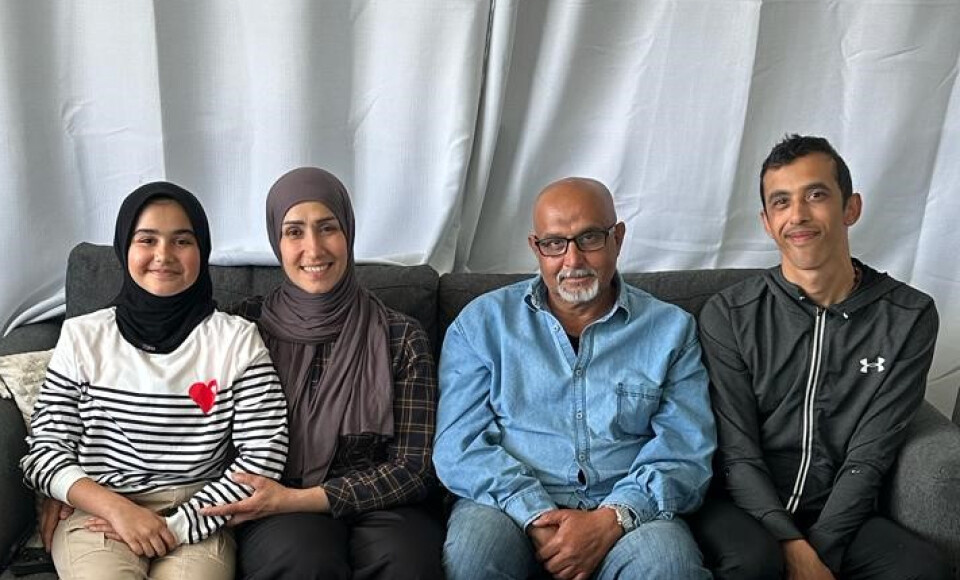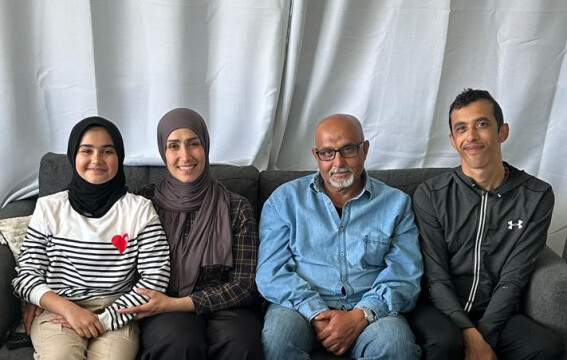“In Iraq, they said if you didn’t leave, we are going to kill you. We are going to kill all of the family.”
As Jaafar Imran recalls this chilling warning, it is hard to imagine the struggles the family went through to begin a new life in New Zealand. Along with his wife, Ghusoon Khasmir, and four children – Sajjad, Mustafa, Murtadha and Fatimah – Jaafar recently celebrated his one year Kiwi anniversary, settling into their new lives in Dunedin.
Ten years prior, they were fleeing their homes and venturing into an uncertain future.
Waiting for something
“It was dangerous to stay and continue living in Iraq – that is why we left there,” Jaafar explained, with the help of a translator. While Jaafar and Ghusoon are still working on their English, their four children have been quick learners, through a combination of study and work.
“Once we went from Iraq, we travelled to Indonesia. I was scared about my family, because we were unable to work. I was scared for my children’s future; they could not continue studying. At the same time, I was scared about how I would engage with that community, a completely different community than traditional.”
Indonesia was not just a stopover. The Imran family was essentially trapped in Indonesia for nine years. Unable to work, unable to attend school and just waiting for a response to be able to travel somewhere. Ghusoon said exactly what they were waiting for was as unknown as the destination.
“We didn’t know what will happen to us on the next day – will we continue living, will something happen to us, something bad, something good – we were trying to live over there.”
Ghusoon said they entered depression once they had left Iraq for Indonesia but had no other option, but to leave. For Jaafar, the weight of the world was on his shoulders.
“Once we went through Indonesia and found the situation over there so bad, I felt I cannot do anything for my children. I felt that I had damaged my children’s lives, by my hand, because I chose to go to Indonesia and live there. My son, Sajjad, is now 26 years old – he couldn’t study in Indonesia so his education was super bad. I was depressed and at the same time I felt that everything was in my hands, because I didn’t know if this choice was correct or bad for my children.”
The rescue boat
Ghusoon said after nine years of feeling they couldn’t do anything in their life, the call finally came for them to relocate to New Zealand. The first few days were scary, as they did not know anything about New Zealand. Now, it is home.
“Red Cross, for us, is like the rescue boat. Once we arrived at the airport in Dunedin, we met the Red Cross there and they took us to a house. After that they started taking us everywhere in Dunedin, so that we could get to know the places to make sure we can go everywhere by ourselves.”
Ghusoon said without the Red Cross, the family wouldn’t be able to be where they are right now, facing different challenges that would make life difficult.
“It has completely changed. Once we arrived in New Zealand, we felt safe. We love the Kiwi people that are living here – they are so kind and are lovely people. We trust that our children will have a good future from an education side, and from the work side. We feel like our health has been renewed – it’s so good right now and that’s about our mental health. Everything right now is perfect for us; we are so happy.”
For Jaafar, the feelings are simpler – he feels human again.
“Once we came to New Zealand, we felt human, because in Indonesia we were just sleeping, eating – that’s all. We feel like in Indonesia we were aliens, we don’t do anything. But once we came to New Zealand, we started thinking ‘we are human, we have human rights here, we have everything that we need, we are similar to other humans’.”
Settling into a new home
Life in Dunedin is not without its challenges. Mustafa (22) has a learning disability, which the Imran family provides support for. While actively and passionately learning English, the language barrier remains. The famous Otago cold is also taking some getting used to.
“Fatimah (11), once we arrived here, she had no English. So she suffered because she didn’t understand anything or anybody,” Ghusoon said. “The Red Cross helped her to go to school and enrolling her in the school which was so good for her. We didn’t know how to enrol the family in school; we didn’t know anything about this.
“They helped her in enrolling in English and the teachers at the school helped her in improving her English, so her English right now is super good – within one year, can you imagine?”
Oldest child Sajjad works full time, while Mustafa’s English has improved to the point he is now able to work as a casual while studying. As he has a disability, he spends time doing activities with Red Cross volunteers and even volunteers himself, helping prepare homes for incoming families. Bashar, a fellow former refugee from Syria, works with former refugee youth in the area. He has been supporting Mustafa in improving his language skills.
Murtadhar was only seven when he arrived in Indonesia and was unable to study or even enter school for the nine years the family was there. He entered New Zealand school in Year 11 and has already won a prize for the best student who can to New Zealand as a refugee. As they place a high premium on academic development, the progress of their children is a source of particular pride for Jaafar and Ghusoon.
Their pride extends to how the family is adapting to Kiwi life. New Zealand Red Cross organised for the Imran family to go to a marae, which doubles as a meeting point for families around Dunedin from similar backgrounds. The family has been able to make friends and share stories. They have even been invited to their first Kiwi wedding, something Ghusoon is especially excited about.
Mustafa, in particular, loves the marae and helps out whenever he can. Fatimah is learning Māori at school and has even performed in kapa haka.
Giving back
When asked what the support of New Zealand Red Cross has meant to the Imran family, Jaafar described being able to see, having been blind for so long.
“I am thankful for everything that has happened to us in New Zealand.”
When asked why people should think about supporting New Zealand Red Cross, Ghusoon said they are doing their best to help former refugee people in New Zealand.
“Please help the Red Cross as much as you can. They are doing lots to help people in Dunedin and around New Zealand. Once people come here, they don’t leave them until they know everything they need to know in New Zealand,” she said.
“They are so helpful. Without them we would not have as much as we have now and would meet such challenges in our lives. They are helping with mental health and supporting with everything they can imagine.
“Our family needed to move into our own house – I was so scared about what I should do, how can I look for another house, how can I go on a bus … everything. But once I said I needed help, the Red Cross was the first to help.”
- A special thanks to Dima, our translator, for helping with this interview
- Quotes have been changed from third person narrative (via translator) to first person.


